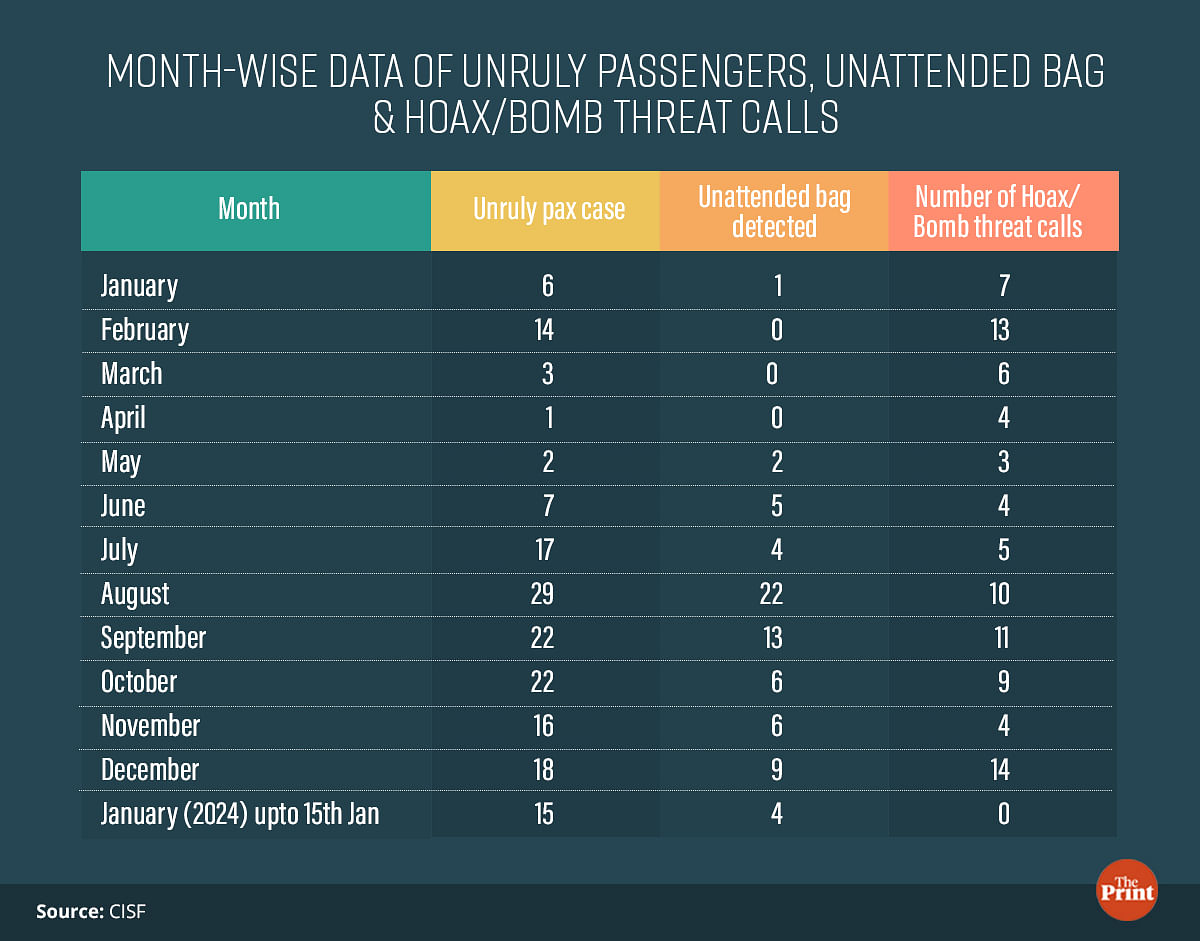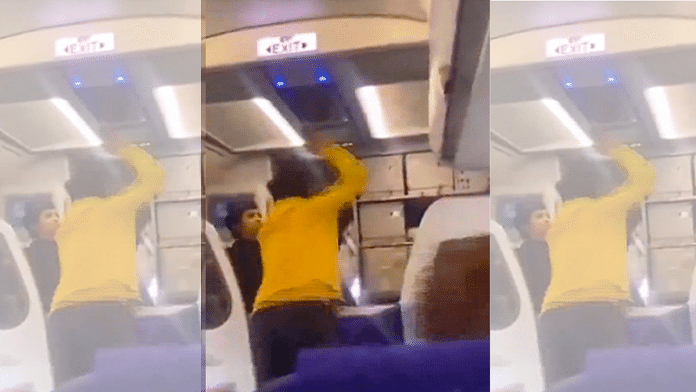New Delhi: IndiGo flyer Sahil Katariya is not the only air passenger to lose his cool this nascent year. Turns out 15 cases of unruly behaviour were reported in as many days, according to the Central Industrial Security Force (CISF).
If the Directorate General of Civil Aviation (DGCA), the airlines, the passengers and other stakeholders are unable to cooperate in this season of bitter cold and dense fog, a spurt in such ugly confrontations can well result in the overall tally crossing the last year’s 167 cases, in the next 11 months.
All these cases were reported from 67 airports under the security cover of the CISF, which maintains a month-wise data of such unsavoury incidents.
According to the DGCA’s Civil Aviation Requirements (CAR), unruly passengers are defined as those fliers committing any of the five activities: “consuming alcoholic beverages or drugs resulting in unruly behaviour; smoking in an aircraft, failure to obey the instructions of the pilot-in-command; endangering the safety of an aircraft and persons inside it; or threatening aircraft crew or fellow passengers physically; or with abusive language or hampering the duties of crew members”.
Based on these disorderly activities, the DGCA mandates airlines to mark unruly passengers at three levels, with the first dealing with “unruly behaviour (physical gestures, verbal harassment, unruly inebriation etc.)”.
The second level comprises “physically abusive behaviour (pushing, kicking, hitting, grabbing or inappropriate touching or sexual harassment etc.)”, while the third level is identified as “life-threatening behaviour (damage to aircraft operating systems, physical violence such as choking, eye gouging, murderous assault, attempted or actual breach of the flight crew compartment etc.)”

ThePrint went through the CISF’s month-wise data and found that of the 167 cases reported last year, more than 50 percent were reported in the second half with August topping the list with 29 incidents.
September and October came close with 22 cases each, followed by December (18) and July (17). From March and June, the situation was better as such cases were in single digits, according to the CISF.
Also Read: Cautious pilots, jittery crew, possible bad press — why many ‘unruly’ passengers go unreported
How unruly incidents are dealt with
Given that there are multi-layer factors in the airline operations, a senior CISF officer explained to ThePrint, even a lack of synchronisation for a minute results in confusion and chaos leading to cases of unruly behaviour.
As soon as the cabin crew reports an unruly passenger, the airline sends the complaint to its internal committee comprising representatives from another airline and passenger association, or a retired officer of the Consumer Dispute Redressal Forum as members. The panel assesses the level of unruly behaviour.
Till the internal committee comes out with its report, the airline puts the unruly passenger on the no-fly list. If the committee fails to give its decision and order in writing within 30 days, the person will be free to fly again.
For level 1 offences, the DGCA mandates banning such passengers for up to three months while it can go up to six months for level 2 offences. For level three offences that include life-threatening behaviour, the aviation regulatory body mandates a ban for a minimum of two years.
In the case of Katariya, whose video clip of slapping the co-pilot is all over the internet, the CISF handed him over to the Delhi Police. An FIR was registered based on a complaint from the co-pilot under Section 323 (voluntarily causing hurt), 341 (wrongful restraint), 290 (public nuisance) of IPC and Section 22 of the Aircraft Rules, 1937.
IndiGo issued a statement saying that “incident is being reported to independent internal committee for appropiate action and inclusion of the customer on the ‘no-fly list’ as laid down in regualatory guidelines”.
The senior CISF officer told ThePrint that the force and airport staff have to also deal with two more “nuisances”, i.e., bags left behind or unattended by passengers and fake bomb threat calls.
Sixty-eight cases of unattended baggage were reported last year.
Overall, 90 hoax calls were received last year, with December reporting the maximum of 14. Next in the list was February (13), September (11), and August (10).
Four cases of unattended baggage were reported till 15 January this year. No hoax call was reported in this period.
The CISF and airport staff had to deal with complaints of 72 unattended bags last year. “Dealing with this particular problem is troublesome because the force has to deal with a mess that it is not designed to solve,” another senior CISF officer said.
(Edited by Tony Rai)



